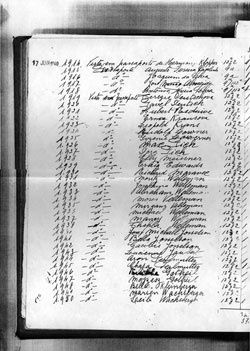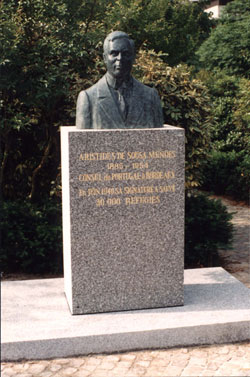- Good Stuff -
- 5mins -
- 858 views
Sousa Mendes Helped Thousands Of Jews Escape the Holocaust. He Died Unknown.
At great personal risk, Sousa Mendes issued thousands of visas during May and June of 1940 in a feat characterised by Holocaust historian Yehuda Bauer as “perhaps the largest rescue action by a single individual during the Holocaust.”
Aristides de Sousa Mendes issued thousands of Portuguese passports against orders
Aristides de Sousa Mendes do Amaral e Abranches was one of the great unsung heroes of the Second World War. As the Portuguese consul stationed in Bordeaux, France, he found himself confronted in May and June of 1940 with the reality of many thousands of refugees outside the Portuguese consulate attempting to escape the horrors of the Nazi war machine.
These people were in desperate need of visas to get out of France, and a Portuguese visa would allow them safe passage through Spain to Lisbon, the capital of Portugal, where they could find liberty to travel to other parts of the globe.
Portugal, officially neutral, yet unofficially pro-Hitler and under the dictatorial rule of Antonio de Oliveira Salazar, issued a directive – the infamous “Circular 14″ – to all its diplomats to deny safe haven to refugees, including explicitly Jews, Russians, and stateless persons who could not freely return to their countries of origin.
Sousa Mendes’ act of heroism consisted in choosing to defy these inhumane orders and follow his conscience instead. “I would rather stand with God against Man than with Man against God,” he declared.
In all, Sousa Mendes issued thousands of visas during that time, with the period of highest intensity lasting around twelve days, from June 12-23, 1940. This heroic feat was characterized by the Holocaust historian Yehuda Bauer as “perhaps the largest rescue action by a single individual during the Holocaust.”
Source: SousaMendesFoundation

For his act of defiance Sousa Mendes was severely punished
For his act of defiance Sousa Mendes was severely punished by Salazar, stripped of his diplomatic position and forbidden from earning a living. He had fifteen children, who were themselves blacklisted and prevented from attending university or finding meaningful work.
In this way what was once an illustrious and well-respected family – one of the great families of Portugal – was crushed and destroyed. The family’s ancestral home, known as “Casa do Passal,” was repossessed by the bank and eventually sold to cover debts.
Before his death in 1954, Sousa Mendes asked his children to clear his name and have the honor of the family restored. His sons and daughters, along with their children – now scattered all over the globe – have fought for decades to have his deeds posthumously recognised.
The first recognition came in 1966 from Israel, which declared Aristides de Sousa Mendes to be a “Righteous Among the Nations.”
In 1986, the United States Congress issued a proclamation honoring his heroic act. Later he was finally recognised by Portugal, when its President Mario Soares apologised to the Sousa Mendes family and the Portuguese Parliament promoted him posthumously to the rank of Ambassador.
The face of Aristides de Sousa Mendes has now appeared on postage stamps in several countries.
Source: SousaMendesFoundation

De Sousa Mendes’ Act of Conscience cost him dearly and he died in poverty and disgrace
Aristides de Sousa Mendes’s act of conscience consisted of defying the direct orders of his government and exhibiting courage, moral rectitude, unselfishness, and self-sacrifice by issuing visas to all refugees regardless of nationality, race, religion or political opinions. Knowing he would face harsh consequences for his actions, Sousa Mendes decided to act in accordance with the dictates of his conscience and Catholic faith.
For this adherence to his sense of humanity, Aristides de Sousa Mendes was rendered helpless in a society which no longer recognised his diplomatic status and forbade him from practicing law to earn a decent living and support his family. He spent the rest of his life pleading his case and being ignored time and again by the Portuguese dictator Salazar and his political machine.
The only help he received was from COMASSIS — a Portuguese-Jewish aid organisation financed by the American Jewish Joint Distribution Committee, which fed the Sousa Mendes family in its soup kitchen — and by the Hebrew Immigrant Aid Society (HIAS), that helped some of his children to emigrate.
Aristides de Sousa Mendes died on April 3rd, 1954 in poverty and disgrace, at the Franciscan Hospital in Lisbon. He was buried in a Franciscan tunic for lack of appropriate clothes of his own. Even until this bitter end, Aristides de Sousa Mendes knew that he acted humanely on behalf of thousands of innocent people and stood by his decision to save their lives.
“I could not have acted otherwise, and I therefore accept all that has befallen me with love.”
– Aristides de Sousa Mendes

Those Who Helped
Manuel de Vieira Braga, the Portuguese Vice-Consul in Bayonne, issued hundreds of visas, no questions asked, to the long line of refugees lined before the consulate, following directions from his superior Aristides de Sousa Mendes.
Emile Gissot, the honorary Portuguese Vice-Consul in Toulouse, directed refugees to the Dutch consulate to obtain visas for Curaçao, thereby enabling Gissot to grant “legitimate” transit visas to Portugal, but he also issued visas without this cover.
José de Seabra, the consular secretary at the Portuguese Consulate in Bordeaux, should also be recognised for standing by Sousa Mendes and helping him issue many more visas than he would have been able to without his help. Many of the surviving Sousa Mendes visas from Bordeaux bear the signature of Seabra.
Aristides de Sousa Mendes was inspired by Rabbi Chaim Kruger, who refused to accept the visa offered to him until all of the Jewish refugees in Bordeaux received them too.
This selfless refusal was the catalyst for Sousa Mendes’s large-scale rescue action. Furthermore, Rabbi Kruger’s role in collecting passports and delivering them in batches enabled Sousa Mendes to issue the visas faster and more efficiently.
Source: SousaMendesFoundation.org


